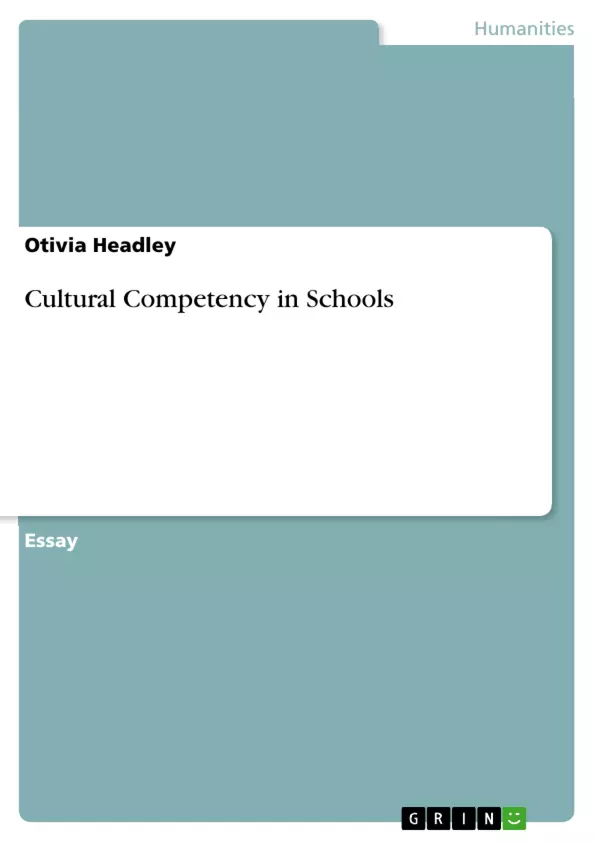With the completion of my Master’s Degree in Clinical Social Work, I plan to work in a school setting, focused on the youth and adolescent populations. I have always found an interest in working with children because I see them as blank canvases. Even with children that grow up in difficult and sometimes unbearable circumstances, if caught early enough they can be helped and directed in a more positive path.
To counteract a perceived lack of responsibility, communication, and accountability on the part of School Systems, I believe the practice of Cultural Competency would help repair and reconnect the School System with the families of students, giving children more social support to succeed in life.
I consider a Culturally Competent educational institution one where behavior is assessed accurately, there is a minimal miscommunication of cross-cultural experiences and there are effective services and interventions.
Along with these considerations being acknowledged, I would also strive to organize a community outreach program that is equipped with interpreters and translation services (if needed) and culturally sensitive therapeutic family sessions giving voices to the narrative of the families as a whole.
As a School Social Worker I want to be mindful about not only my power and privilege but also mindful about how my students view their own power and privilege. Being Culturally Competent would assist in the clarification of power and privilege and allow for all children no matter what culture, race or ethnicity to feel adequate and equal (at least in school).
Inhaltsverzeichnis (Table of Contents)
- Cultural Competency in Schools
- Cultural Competency within a School Setting
- Culturally Competent School Social Work
- Barriers to Culturally Competent School Social Work Practice
- Addressing the Challenges of Oppression
- Individualistic Approach to Cultural Competency
- Social Work Practice Categories
- Cultural Competency at the Macro Level
- Cultural Competency at the Micro Level
- Power and Privilege in School Settings
- Combating the View of Unequal Value
- Programs and Initiatives for a Culturally Responsive School Setting
- Peer Mediation
- Elective Courses
- Parent Liaison
- Minority Parent Committee
Zielsetzung und Themenschwerpunkte (Objectives and Key Themes)
This paper explores the concept of cultural competency in school settings, focusing on the role of School Social Workers in promoting inclusive and equitable education for all students. It examines the importance of understanding students' diverse backgrounds, learning styles, and experiences to create a culturally responsive environment. The author emphasizes the need for a shift from a deficit-based approach to a strengths-based approach in working with students from marginalized communities.
- Cultural competency in education
- The role of School Social Workers
- Addressing systemic barriers to equity
- Promoting inclusive and equitable learning environments
- The impact of power and privilege on students' experiences
Zusammenfassung der Kapitel (Chapter Summaries)
The text begins by highlighting the author's personal experiences in both a predominantly Black/Hispanic Catholic all-girls school and a local public high school. The author emphasizes the importance of individualized attention, cultural sensitivity, and open communication in creating a supportive educational environment.
The text then discusses the definition and significance of culturally competent School Social Work practice, drawing upon the work of Teasley (2010). The author explains how School Social Workers can act as liaisons between the home, community, and school, promoting healthy developmental and educational outcomes for students from diverse backgrounds.
The author goes on to discuss the challenges and barriers to culturally competent School Social Work practice, particularly in large, urban school districts with high minority student populations. The author suggests that involving minority groups in their own growth process can help facilitate positive change and promote cultural competency.
The text then delves into the importance of understanding students' individual socioeconomic status and cultural backgrounds to provide effective support and interventions. The author emphasizes the need to address the multilayered influence of oppression and provide culturally competent services to individuals, families, and groups.
The author concludes by exploring the different levels of social work practice (macro, mezzo, and micro) and the need for a shift towards culturally competent practices at all levels. The text highlights the importance of collaboration, understanding school politics, and identifying informal power brokers in creating a culturally responsive school setting.
Schlüsselwörter (Keywords)
This work focuses on the core concepts of cultural competency, school social work, equity, inclusion, diversity, power and privilege, oppression, marginalized communities, and individualistic approaches in education.
Frequently Asked Questions
What is the definition of a culturally competent educational institution?
An institution where behavior is assessed accurately, cross-cultural miscommunication is minimized, and effective services and interventions are provided to all students.
What is the role of a School Social Worker in promoting cultural competency?
They act as liaisons between home, school, and community, advocating for equitable outcomes and addressing systemic barriers for marginalized students.
What are the barriers to culturally competent practice in urban schools?
Barriers include a perceived lack of accountability in school systems, language obstacles, and a deficit-based approach to minority student populations.
How do power and privilege affect students in school settings?
Power and privilege can create views of unequal value; cultural competency aims to make all children feel adequate and equal regardless of their background.
What initiatives can help create a culturally responsive school?
Programs such as peer mediation, elective courses on diversity, parent liaisons, and minority parent committees are effective strategies.
Why is a strengths-based approach preferred over a deficit-based one?
A strengths-based approach views students as "blank canvases" with potential rather than focusing solely on their difficult circumstances or perceived lacks.
- Quote paper
- LMSW Otivia Headley (Author), 2013, Cultural Competency in Schools, Munich, GRIN Verlag, https://www.grin.com/document/345101



